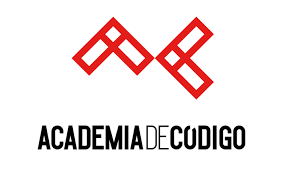Backed by a EUR 723 500.00 investment from the Portugal Social Innovation Social Impact Bond as well as private investors Calouste Gulbenkian Foundation and ASSOP, Academia de Código bootcamps in Fundão have enabled dozens of unemployed people to find a coding job in just 14 weeks!
“Coding is no longer reserved for nerdy ‘computer geeks’. Nowadays, with a bit of investment and effort, pretty much anyone can kick start their career as a junior software developer within months.” That, in a nutshell, is the message João Magalhães, co-founder and CEO of Academia de Código wants to send to anyone willing to fully and passionately engage in a software development career. “We strongly believe that there’s a lot of wasted talent out there –young people, labelled as school dropouts, either unemployed or stuck in dead-end jobs – who only need to be given a fair chance in order to turn things around. The coding job market badly needs them but needs us help them gain the skills they need and to get it done in just 14 weeks”, he says.

A team of instructors, some of whom are bootcamp graduates themselves, guide Academia de Código students through the course lifecycle.
According to the European Commission, Europe is facing a shortage of up to 900 000 skilled ICT workers, 15 000 of whom are needed in Portugal alone. On one hand there is an extremely high youth unemployment rate, whilst on the other hand there is an enormous need for coders in the Information Technology sector.
The Academia de Código bootcamps intervention thus focuses on this mismatched demand and supply, allowing its students to radically change their professional path.
A critical support
Academia de Código received financial support within the government initiative Portugal Social Innovation (PSI) whose mission is to promote social entrepreneurship through EU funds. “João is a real champion in the reskilling and tech4good scene as he has turned Academia de Código into one of the most successful and well-known social innovation projects in Portugal in the last decade”, says Filipe Almeida, President of PSI. Between January 2017 and December 2019, the Social Impact Bond intervention welcomed 174 participants through 9 bootcamps in the central region of Fundão.
The PSI Social Impact Bonds Programme, which is featured in the fi-compass publication, Supporting the development of Social Finance Ecosystems in Member States under ESF, is an outcome payment mechanism funded by an ESF grant support that pays for validated outcomes achieved by specific social innovation projects in an area of public policy.

“The bootcamp represents an incredible time saving in this training course. It couldn't be better in terms of learning in relation to time.”
João Magalhães, co-founder and CEO of Academia de Código
The grant support funds 100% of eligible cost financing to beneficiaries, upon validation of contracted outcomes, with no maximum threshold per project. Project durations can go up to five years between the start of the project, the outcome validation and the related payment.
“In the case of Academia de Código, private investors, who were not for profit/charitable organisations, fully financed the project upfront and had their investment returned if the contracted social outcomes were met. This is the value approved for the specific contracted outcomes"
“The contracted result is the employment of at least 11 unemployed young people in each 9 bootcamps 3 months after intervention. As these goals were met in each bootcamp, investors had their investment returned. The investment also allows places on the bootcamp to be offered free of charge to young people by Academia de Código”.
Filipe Almeida, President of Portugal Social Innovation
With an employment rate above 90%, Academia de Código consider the placement of their graduates within the job market as part of the bootcamp’s syllabus. “We are not ‘done’ until they are happily employed. As a social impact start-up it couldn’t be any other way: employability is what, in the end, measures our actual success and efficacy”, says Magalhães while he adds, “Our goal is to match the right talent with the right environment for them to grow and thrive in. We do not do blind, mass-scale placement. We carefully and passionately cater for both our grads and our employers’ companies’ real needs”.

According to co-investors who took part in this impact bond, approximately 48% of contracts to date are open-ended contracts, with an average entry-level salary of EUR 888 per month.
World leaders in engineering and IT services such as Capgemini Engineering and DXC Technology hired more than 50% of Academia de Código students, the remaining being recruited by other employers, including Academia de Código itself, which hired four SIB students to fill instructor positions.
The impact of a constructive collaboration
The multi-stakeholder partnership between the private, public and social sectors was key to the success of the SIB given that social challenges are complex in nature and require complementary skills from various stakeholders. The PSI impact bond allowed Maze Impact to test a new financing instrument while it enabled Academia de Código to prove the outcomes of its intervention, with the long term objective of scaling-up the operation across Portugal.
“We have already approved 20 Social Impact Bonds with an overall investment of around EUR 10 million through the Portugal Social Innovation initiative, placing Portugal as the EU Member State with most SIBs and the fourth highest volume of investment mobilised in the sector, after Finland, France and the Netherlands. We will certainly continue to develop and improve the SIBs innovative financing model which has already proven to be an effective way to prototype critical public policies in partnership with the private and the social sector”, says Filipe Almeida.
Conceição Matos, Director of the Department of Vocational Training at the National Institute for Employment and Vocational Training (IEFP), for whom this outcome-based contracting methodology was a first, also sees those results as very positive:
“As a Ministry, we pay Academia de Código by results. By supporting this type of projects, we wanted to foster partnerships between the public sector and civil society, regarding innovative projects in the field of capacity building and enhancing the employability of all involved. The fact that we achieved this purpose is the real added value of the project and the most significant aspect to bear in mind”.
A beacon of hope
Academia de Código bootcamps usually cost EUR 7 000, below average for coding schools in Europe. Yet, many of their candidates, being unemployed or working in poorly paid jobs cannot afford the fee. “We propose various financing/sponsorship solutions in order to help grads overcome their financial shortcomings. We believe that where there’s talent, there are always solutions. This ‘No Money, No Problem!’ policy of ours, which has been enabled by the SIB investment, has been one of our strongest flagships, functioning as a ‘beacon of hope’ for the young people who look to us as a way into the coding profession”, says Magalhães.
And despite the Covid pandemic, the enthusiastic entrepreneur does not see any major clouds on the horizon:
“Business-wise, 2020 has had no impact on our activity. We have managed to smoothly sail the pandemic storm without decreasing our numbers of student enrolments. Like many companies, we faced some challenges in the beginning, adapting to both hybrid and remote teaching. After the storm, we can now say that we have learnt a lot and we are now much better prepared for teaching through formats that best fit each student’s needs”.